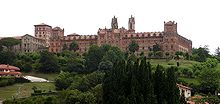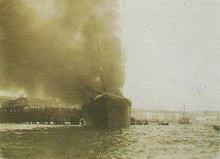- Claudio López Bru
-
 Claudio Lopez Bru.
Claudio Lopez Bru.
Claudio Lopez Bru, segundo Marques de Comillas (Catalan: Claudi López i Bru, segòn Marquès de Comillas) and Grandee of Spain (Barcelona, 1853 - Madrid, 1925), was a Catalan businessman , an immensely rich shipping magnate and landowner.
A Catholic, he was determined, according to a writer on the Spanish Catholic world, Frances Lannon, 'to keep his employees pious and out of radical unions.' [1] He was a dominating influence in the National Council of Catholic Worker Corporations CNCCO, a kind of industrial branch of Catholic Action. A reactionary he was criticized by the Asturian priest Maximiliano Arboleya Martínez who commented that : " The workers in our Circles are talked to about religion, about morality, about resignation, about their obligations - it is almost never that anyone talks to them about the injustices, about the obligations of the capitalists..."
For thirty years, (1895-1925), Comillas dominated Catholic policy-making on labour relations. [2]
Contents
Biography
Claudio Lopez Bru was the fourth son of the founder and owner of Compañía Transatlántica Española, Antonio López y López (1817–1883), and Catalan lady Lluïsa Bru i Lassús.
He studied law at Barcelona University (Universitat de Barcelona). In 1883, following his father's death, he inherited the title "Marquis of Comillas". Barely in his thirties, he ran all the companies his father had started, foremost of which were Compañia General de Tabacos de Filipinas and Compañía de los Caminos de Hierro del Norte de España. In the following years, Claudio himself would expand his father's estate, with coal company Hullera Española, Banca López Bru, Constructora Naval and Banco Vitalicio.
He promoted the Pontifical Seminary of Comillas (Cantabria). The first building was inaugurated in 1890 and through a decree of the Vatican, it became the Pontifical University of Comillas[3]
In 1893 vessel Cabo Machichaco, a ship not belonging to Claudio's CTE shipping line, exploded at the harbor in Santander. The explosion was of such magnitude that a thick mooring cable from the ship hit Peñacastillo, 8 km away, killing a person. Santander harbor was destroyed and the death toll reached 500.
As soon as he got the news, Claudio went to the spot and sent a train from Barcelona with doctors, nurses, firemen and medical equipment in order to treat the thousands of wounded.
After this action, Claudio consistently refused any attempt by the authorities to honor and reward him, stating simply that he had done merely his duty as a Christian.
He acted similarly after the 1908 Messina earthquake that devastated this Italian town, causing tens of thousands of deaths. Claudio had his ship, the "Cataluña", one of his CTE vessels, transformed into a hospital and sent it rushing to the place.
Comillas was a dominant figure in determining Catholic policy on labour relations. A workers section of Catholic Action was set up under his influence in 1894, followed in 1919 by a women's, and in 1924 by a youth section. They were firmly under hierarchical and magnate control, 'associations of leaders with few followers.' The most characteristic efflorescences of Catholic Action at this time were words and gestures rather than purposeful organisations, - congresses and processions rather than flourishing workers' associations. [4] Comillas financed spectacular pilgrimages for working men to shrines in Spain and abroad. And, impressed by the Catholic Railwayman's syndicate , led by Agustin Ruiz, and its performance in oppposing the railway strike of July 1916 and the general strike of August 1917, tried hard to create an accompanying web of Catholic miners syndicates, especially in the militant Asturian pits, where he himself owned pits. Comillas was also influential in the Popular Social Action (ASP) initiative, founded by a Jesuit priest, Gabriel Palau in 1907 in Barcelona. Palau wanted to make Barcelona the centre of a national network of social Catholic initiatives. It attracted bourgeois Catholics, and its financial needs were largely met by Comillas. The syndicates that became associated with the ASP were called Professional Unions. "A recent study has emphasised their paternalism - at the most generous calculation they never accounted for more than 2% of the Barcelona manual work-force. They soon established a reputation as strike breakers." [5] Comillas was an opponent of the Sindicatos Libre of Pedro Gerard, a Dominican who was convinced that workers must receive adequate wages, as of right, not merely subsistence wages. His Free Syndicates opposed the general strike of 1917 along with their confessional counterparts but the extreme conservatism of Comillas still found Gerard uncongenial and, : " one whose ideas if put into practice would cost capitalists like Comillas much more in higher wages than they paid into syndicate subventions and mass pilgrimages." [6]
A process of beatification began in 1945.[7]
See also
References
- ^ Frances Lannon, Privilege, Persecution and Prophecy , p.152
- ^ Frances Lannon, Privilege, Persecution and Prophecy, p.148, 153
- ^ Vatican decree "Praeclaris honoris argumentas", approved by Pius X, March 19th 1904.
- ^ Lannon, p.149
- ^ Lannon, p.158
- ^ Lannon, p.156
- ^ Eduardo Fernández Regatillo, S. J.: Un marqués modelo. El siervo de Dios Claudio López Bru, segundo Marqués de Comillas, Sal Terrae, Santander, 1950.
- This article incorporates information from the equivalent article on the Catalan Wikipedia.
External links
Categories:- Catalan businesspeople
- Marquesses of Spain
- People from Barcelona
Wikimedia Foundation. 2010.


